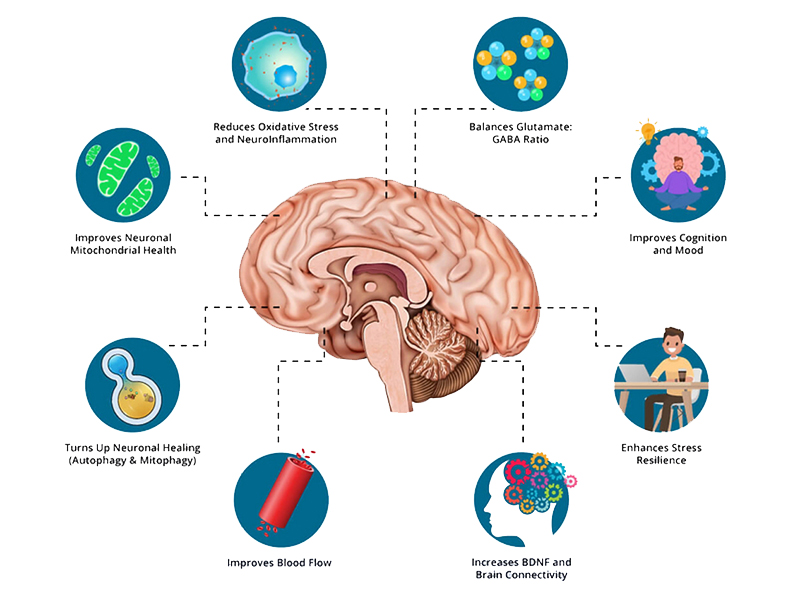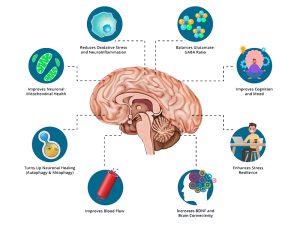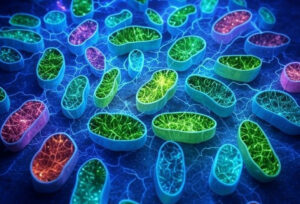What is Autophagy?
Autophagy, derived from the Greek words “auto” (self) and “phagy” (eating), is a physiological process where cells dismantle and recycle their own damaged or unnecessary components. This self-cleaning mechanism is essential for:
- Removing damaged organelles or proteins: By clearing out potentially harmful cellular debris.
- Recycling nutrients: Providing cells with essential building blocks during nutrient scarcity, such as during fasting.
Neural Autophagy
- Neural autophagy specifically refers to this process within neurons, focusing on the brain’s unique needs for cellular cleanup:
- Neurons rely on autophagy to manage protein aggregates, damaged mitochondria, and other cellular waste that can accumulate due to high brain activity.
Neural Autophagy is thought to protects against neurodegenerative diseases: By clearing out toxic protein aggregates, neural autophagy might help prevent or mitigate conditions like Alzheimer’s, Parkinson’s, and Huntington’s disease.
How Fasting Induces Autophagy
- Fasting triggers autophagy as the body responds to nutrient deprivation.
- Energy Conservation: The body conserves energy by recycling cellular components.
- Cellular Repair: Autophagy increases to repair and maintain cellular integrity, especially beneficial for neurons which have a limited regeneration capacity.
Considerations for Fasting for Neural Autophagy
When considering fasting for the benefits of neural autophagy, here are some key points:
- Start with Shorter Fasts: Begin with 16-24 hours to assess your body’s response. This can be part of intermittent fasting protocols where autophagy begins to increase significantly around 12 to 16 hours into fasting, with neuronal benefits possibly starting around 24 hours.
- Progress to Longer Fasts: For more pronounced effects, some advocate fasting for 3 days (72 hours), where autophagy might be significantly enhanced, potentially aiding in cellular repair and cognitive function. However, extended fasting should be approached with caution.
- Extended Fasting: There’s mention of fasts from 36 hours to 3 days for maximal activation of chaperone-mediated autophagy, a specific type beneficial for neural health.**
- Hydration: Staying hydrated is crucial, particularly during longer fasts, to support bodily functions.
- Consultation: Before engaging in longer fasting periods, especially with pre-existing health conditions, consulting with a healthcare provider is wise to tailor fasting to your health needs.
Remember, the optimal fasting duration for neural autophagy can vary greatly among individuals based on health goals, current health status, and lifestyle. Personal experimentation under safe conditions, or better yet, under medical supervision, is advised to determine what works best for you.
Duration and Continuation of Autophagy
Once initiated, the duration of elevated autophagy depends on:
- Fasting Duration: Autophagy can start within hours and might continue as long as the fasting lasts or until nutrients are replenished. Peak activity might occur around 24 to 72 hours.
- Nutrient Intake: Eating, particularly a meal high in nutrients or protein, signals the body to downregulate autophagy, shifting from breakdown to building processes.
- Cellular Needs: Autophagy continues as long as there’s a need for cellular cleanup or repair.
- Physiological or Pathological Conditions: Chronic conditions or aging might alter baseline autophagy levels, influencing how long and how effectively autophagy functions.
- Genetic and Environmental Factors: These can affect the efficiency and duration of autophagy.
In summary, while fasting can promote neural autophagy, the exact timing and duration of this process are highly individual and depend on a variety of factors including the fasting protocol, the individual’s metabolic state, and the reintroduction of nutrients. Always approach fasting with a balanced perspective on health, ensuring it complements other health practices rather than standing alone.
By: Linda Wulf and Grok 2
Click here for more information on Autophagy and Fasting. If you want to learn more about autophagy and fasting, feel free to reach out to us! We are here to provide you with the latest research, tips, and guidance on how fasting can activate autophagy and improve your overall health.

Linda Wulf
Linda Wulf is a cancer rebel, advocate, and independent researcher. Diagnosed in 2023 with primary CNS lymphoma, she declined standard chemotherapy and pursued a root-cause, immune-supporting path. Twenty-three months cancer-free via root-cause approach.










